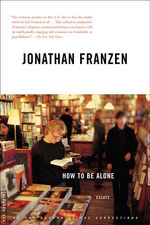Sometimes I think we, as a culture, are learning and improving. Other times, I’m pretty sure we are all going to hell (WAAGTH).
For example, on one hand, I feel—totally anecdotally—as if more people know better than to have a loud conversation walking down a public sidewalk, exposing fellow pedestrians to TMI. (My favorite awful example as I walked down Dearborn: “Don’t tell anyone, but she has cancer.”)

But then I observe Beth and Whitney nearly colliding head on with an oncoming walker who’s looking at her cell phone or texting. Or I get on an elevator and instead of good morning, there’s a guy with headphones who’s pretending hard that I’m not there, all while I can hear his shitty music leak out of his ears.
So yeah, it brings out Mr. Grouchy Mike.
I don’t begrudge their enjoyment, it’s not the end of the world. Or, maybe it is.
I was thinking about all this the other day and I remembered an essay by Jonathan Franzen that I read many years ago, and which he wrote many years prior to that—1998 to be exact. It was a most interesting take on what was then a new concern: a loss of privacy, particularly in the context of the then nascent Internet age.
He argued that privacy is hardly at risk. That we can isolate ourselves and be more private than ever in many ways. That in a small town in 1892, the shopkeeper knew everyone’s business, and really, that everyone knew everyone’s business. That today, small families live in giant homes where everybody has their own room and even bathroom. And that we are inflicting our personal privacy on everyone else.
I can’t do his full thinking justice—you can read an excerpted preview here, and I hope you will. It’s called” Imperial Bedroom” and it’s in a collection of his essays called “How to Be Alone.”
Anyway, what Franzen rued more than privacy was a loss of the public space as he (and I and many of us) have come to understand it. That a sense of order and decorum in public spaces that has served us well is breaking down. An excerpt on walking down a public sidewalk:
All I really want from a sidewalk is that people see me and let themselves be seen, but even this modest ideal is thwarted by cell-phone users and their unwelcome privacy. They say things like “Should we have couscous with that?” and “I’m on my way to Blockbuster.” They aren’t breaking any law by broadcasting these breakfast-nook conversations. There’s no PublicityGuard that I can buy, no expensive preserve of public life to which I can flee. Seclusion, whether in a suite at the Plaza or in a cabin in the Catskills, is comparatively effortless to achieve. Privacy is protected as both commodity and right; public forums are protected as neither. Like old-growth forests, they’re few and irreplaceable and should be held in trust by everyone. The work of maintaining gets only harder as the private sector grows ever more demanding, distracting and disheartening.
That rings true to me. That we care so much about our privacy and our little virtual gated communities, that we ignore the person three feet away.
Franzen again:
A genuine public space is a place where every citizen is welcome to be present and where the purely private is excluded or restricted. One reason that attendance at art museums is growing is that museums still feel public in this way.
And here I had been debating whether to renew my membership to the Art Institute. Debate over.
Amen!
I’m with you, Mike. I once overheard a woman on the bus discussing her session with a psychiatrist. I hear a lot of people with crude, foul mouths, arguing on their phone. It’s gotten easier with most people texting these days. I observe people in traffic, including cement truck drivers, texting while driving. Whoa! And what’s with the ear buds? Don’t people realize that they have to be alert to what’s around them? People in private cars, taxi drivers, and even bicyclists are tuning out the world. They won’t even hear someone yell a warning “Watch out!” before they crash.
Part of the pleasure of being in public is the unexpected connections, smiles, and courtesies you can experience if people are not focused inward. I find myself in places where one has to wait, and I am the only one not immediately pulling out an electronic device to shield myself from either boredom or human contact. I don’t think it’s too much to ask that people pay attention to where they’re going and perhaps engage with other human beings, if only to acknowledge their existence.
Great observations. Just returned from the Canadian Rockies (gorgeous). The only negative was the behavior of some people in the public spaces–selfie sticks and phones everywhere, and used well outside of the marked hiking paths despite polite signage from the Canadians, including some with dire warnings of dangers. Hard to find a little a privacy (or at least quiet) in these public spaces, even when hiking miles out. But still, the positives outweighed the negatives.
Leave a Response